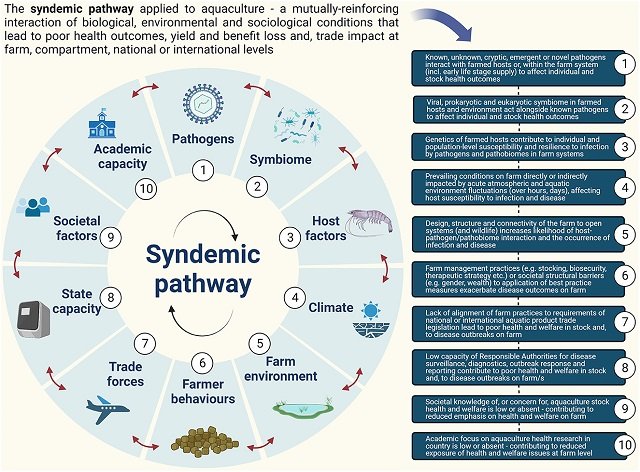
Most of the current and future aquaculture production is concentrated in low- and middle-income countries, highlighting its growing significance in global food security. However, despite its vital contribution, there are significant concerns regarding the availability and implementation of effective policies to ensure a safe and sustainable supply in the future.
The creation of healthy aquaculture systems must go beyond simply excluding pathogens to address the broader host, environmental, and human factors that influence poor outcomes and develop new policies that incorporate these wider factors.
In this context, researchers from the Centre for Environment, Fisheries, and Aquaculture Science (CEFAS), University of Exeter, The Roslin Institute at the University of Edinburgh, the Institute of Aquaculture at the University of Stirling, the University of British Columbia, the University of Liverpool, and the Department of Forestry, Fisheries, and the Environment published a study presenting syndemic theory as a potential framework for implementing the One Health approach.
One Health and Syndemic Theory
The “One Health” approach is a strategy that recognizes the interconnectedness between human health, animal health, and environmental health. To ensure a safe and sustainable supply of aquatic proteins, we must go beyond mere disease mitigation and address the broader drivers of poor outcomes in aquaculture.
Syndemic theory, which considers the interaction of multiple health conditions and social factors, offers a valuable framework for operationalizing this approach.
What is syndemics?
According to the study, “syndemic theory extends our interpretation of disease beyond traditional medical definitions of morbidity, comorbidity, and multimorbidity to include social, economic, and environmental factors that contribute to and exacerbate harmful health outcomes.”
Syndemic theory has been implemented where infectious and non-infectious conditions interact with dominant political, social, and environmental factors.
Syndemics in aquaculture
In the study, researchers evaluate how syndemic theory can be applied to animal health within food systems.
The interaction of biological, environmental, social, and political factors has contributed to diseases that have severely limited the performance, benefits, profits, and food security of the aquaculture sector, both in low- and middle-income countries and in higher-income nations.
According to the study, the researchers propose that a “syndemic pathway” is generating poor health outcomes in aquaculture and urge the incorporation of broader factors, from biological failures to systemic failures in the institutional environment, into national strategies aimed at bolstering sustainability in the aquaculture sector.
Policies based on syndemic theory
To develop policies that incorporate this One Health perspective, several aspects must be considered:
- Disease Surveillance and Control: Implement disease surveillance and control programs that focus on the health of aquatic organisms, environmental integrity, and the health of local communities.
- Environmental Sustainability: Promote sustainable aquaculture practices that minimize negative environmental impacts and foster biodiversity.
- Social and Economic Inclusion: Ensure that aquaculture policies benefit local communities and provide fair working conditions for employees.
Conclusion
Aquaculture is essential for ensuring a supply of aquatic proteins in a constantly growing world, but its sustainability requires a comprehensive approach based on syndemic theory and the One Health principle.
According to researchers, only through collaboration between governments, industry, and the scientific community can effective policies be developed to address the challenges facing aquaculture while simultaneously promoting the health of aquatic organisms, protecting the environment, and ensuring an equitable distribution of benefits. This will not only ensure a safe and sustainable supply of aquatic proteins but also strengthen global food security in the future.
The study was funded by the Department for Environment, Food and Rural Affairs of the UK Government.
Contact
Grant D. Stentiford
Weymouth Laboratory
Centre for Environment, Fisheries and Aquaculture Science (CEFAS)
Weymouth, United Kingdom
Email: grant.stentiford@cefas.gov.uk
Referencia (acceso libre)
Stentiford GD, Tyler CR, Ellis RP, Bean TP, MacKenzie S, Brugere C, Holt CC, Peeler EJ, Christison KW, Rushton J and Bass D (2023) Defining and averting syndemic pathways in aquaculture: a major global food sector. Front. Sustain. Food Syst. 7:1281447. doi: 10.3389/fsufs.2023.1281447

